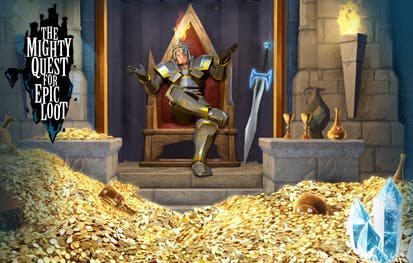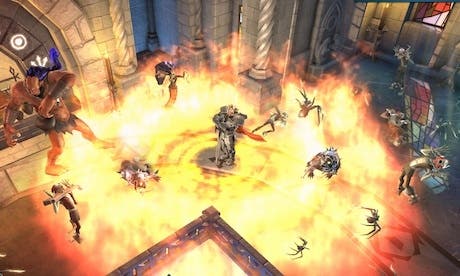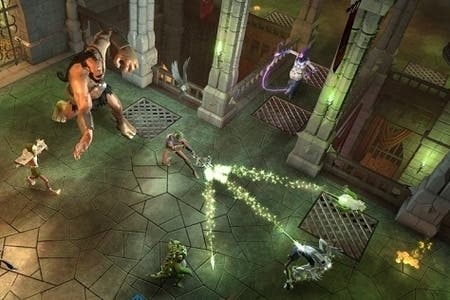The Mighty Quest for Epic Loot: Deadly Rooms of Debt?
Ubisoft Montreal goes free-to-play with this creative blend of construction and destruction.
The Mighty Search for... The Epic Quest for Mighty... The Quest that...
Each time I try to tell somebody about Ubisoft's brand new castle-'em-up, The Mighty Quest for Epic Loot, I get the name a little bit wrong. At least I am trying to tell people about it, mind - and it was hardly the worst piece of titling on display at the publisher's Digital Days event last week. Not with a game called Nutty Fluffies knocking about.

Actually, The Mighty Loot and its Epic Quest is looking really good (as is Nutty Fluffies). It's a hybrid castle-builder and castle-raider at heart, and it's also the first free-to-play online game from Ubisoft Montreal, a team that knows a thing or two about, well, things.
Let's deal with the castle-building part first: it's an admirably tactile and intuitive business here as your cursor roves over a bright 3D environment model, allowing you to then pull and push pieces around. You can yank out courtyards, extend ballrooms, and maybe fling in a few new passageways as you get the design the way you want it. Pieces are entirely modular, and they clip together in a wonderfully satisfying way. The game strikes a decent balance between letting you build what you have in your head and making sure whatever you do finally construct actually looks alright, and amongst the various room types on offer, there are also several art themes, too, so your lair can have a rigorous visual consistency as well as spiked death pits and a crevice that endlessly burps up lava.
As you form your castle, you're trying to make it as hard as possible for any future intruder to reach your treasure room. To do that you can create impromptu mazes from room blocks, and you can throw in monsters and traps. The monsters range from rattly skeletons to huge boss dragons - all done up in the game's goofy cartoon fantasy art style - while the traps include everything from spinning walls of flame to hamster wheels with razor blades attached.

The objective, of course, is to build something that's entertaining for people to fight their way through, and to stop spoilsports from constructing impregnable fortresses, there's a neat countering system in place. Each room - except for the one closest to the treasure room - can only have 20 defence points spent in it, which means you'll have to pick a smart, limited load-out of complementary beasties, each of which adds to your defence total. (That final room can be lavished with a full 38 points, incidentally, encouraging you to turn it into a boss fight.)
But why all these bosses? Why all these traps, monsters, and devious lay-outs? They're because you're building your castle so that other people can raid it - and other people are building theirs so you can return the diabolical favour. It's a lovely piece of design: half Dungeon Keeper and half Diablo, and it means that when you tire of meddling with your own home, you can go and trash someone else's.
This part of the game is a click-heavy action RPG with a four-button hot bar of customisable attacks. It's got skills to learn and armour to wear, and as you work your way through a friend's - or a stranger's - gruesome gauntlet, you'll find yourself fairly showered in handy loot and experience points.

There's a whole campaign to play through on this side of things, in fact, with chapters divided up into groups of five castles, some of which will have been built by Ubisoft, others of which will be culled from the community - presumably using some magical algorithm that somebody came up with while sitting in the bath. Everything eventually feeds back into the building part of the game, though, as you level up your character, become more effective at raiding, and then earn more money to level your own castle up too.
As a free-to-play game, you're going to be able to pay for in-game items, monsters and rooms outright, by the looks of things, but you'll also be able to work through the game the long way, and without spending any money at all. Throughout all of this, whether you're paying or just playing, you're encouraged to engage with the community, inviting in friends from social networking sites, setting wagers with rivals, and rating the castles you play through so the good stuff can rise to the top.
The name may be a bit confusing, then, but there's no mistaking the warmth lurking within wonderful chunky art and the neat dovetailing of complimentary systems. The Mighty Quest for Epic Loot is going to be an exciting prospect when it launches soon on PC - and with its interface and its business model, it's hard not to suspect - or at least hope - that an iPad version could be in the offing shortly afterwards.

